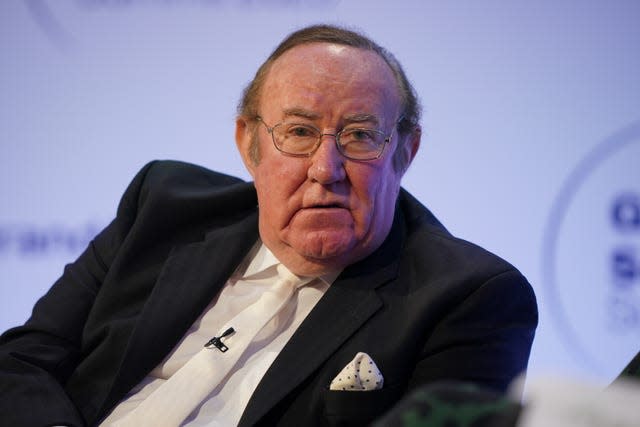Ofcom issues warning over politician presenters ahead of general election
Ofcom has warned broadcasters using politicians as presenters that “the highest level of due impartiality applies during election periods” and breaches could result in “statutory sanctions”.
The regulator’s updated guidance comes after it found GB News in breach of broadcasting rules when three Conservative MPs acted as newsreaders across five different episodes of its programmes.
Ofcom’s probe involved shows presented by former House of Commons leader Sir Jacob Rees-Mogg, as well as minister without portfolio Esther McVey and backbencher Philip Davies, and the channel was warned about potential sanctions if there are further breaches.
Married couple Ms McVey and Mr Davies are no longer part of the GB News line-up.
🚨 Ahead of the next General Election, we're sending a clear warning to broadcasters to maintain the highest standard of impartiality.
We've also issued strengthened industry guidance on rules around politicians as presenters.
🔗 Read more: https://t.co/nkI05gbPLW pic.twitter.com/BTHHI5jGDf
— Ofcom (@Ofcom) April 24, 2024
Ofcom warned it is putting broadcasters “on notice to maintain due impartiality ahead of the general election”.
A statement said: “Broadcasters are reminded that Rule 6.6 of the Code prohibits candidates in UK elections from acting as news presenters, interviewers or presenters of any type of programme during the election period.”
Under current rules politicians are allowed to present current affairs show but not act as newsreaders, and the rules are tightened in the run-up to an election.
Ofcom said: “With a general election due to take place before 25 January 2025, we are sounding a warning to broadcasters to maintain the highest level of due impartiality, in line with our enhanced rules that apply during election periods.
“Any breaches of election programming rules are likely to be serious and to result in Ofcom considering the imposition of statutory sanctions.”
New audience research by the regulator found that while there are “concerns” about politicians presenting current affairs programmes, there is “no clear consensus for an outright ban”.
Updated guidance reinforces the prohibition on politicians presenting news and “reminds broadcasters that, because politicians have an inherently partial role in society, news content presented by them is likely to be viewed by audiences in light of that perceived bias, which would risk undermining the integrity and credibility of broadcast news”.
The guidance does state that broadcasters “retain editorial freedom to create programmes which move between news and current affairs content” but cautions that is a politician is a the host of a programme “they must ensure they do not act as a newsreader, news interviewer or news reporter at any point in that programme”.
On Tuesday former GB News chairman Andrew Neil said Ofcom needs to “grow a backbone and quick” over the issue of politicians hosting TV programmes.
He told peers: “It may be because the rest of the broadcast universe is on the centre, centre-left so it gave GB news a bit more leeway to settle down.

“I am surprised that any regulator would allow politicians sitting in the Houses of Parliament to present political TV programmes.
“If I had stayed as chairman it would not have happened because I would not have had any politician present a TV show in the first place, and I would certainly never have allowed politicians to interview politicians from the same party.
“I just find that incredible and I think on these areas Ofcom needs to find a backbone and quick.”
After Ofcom issued its warning on Wednesday, the host of BBC Radio 4’s Today programme, Nick Robinson, questioned the media watchdog’s parameters on impartiality.
In a post on X, formerly Twitter, he wrote: “So, @Nigel_Farage – one of the founders & owners of @reformparty_uk – can present an ‘impartial’ programme on a TV ‘news’ channel during the general election according to the broadcasting regulator @ofcom.
“The leader of the party @TiceRichard & its only MP @LeeAndersonMP_ can present programmes in the run up to the campaign alongside @Jacob_Rees_Mogg.
“Is that your idea of impartiality?”
Following the online pushback, Ofcom’s broadcasting director Cristina Nicolotti Squires said she did not agree with comments that said Ofcom’s guidance did not provide a clear enough warning about impartiality, saying: “What we’ve done with today’s research is that we’ve actually spoken to audiences, rather than presenters of various programmes or commentators, and what the audience told us is what we’ve what we’ve published today.”
She added: “Audiences, they’re smarter than perhaps some of these commentators might think, they welcome due impartiality but they also welcome a wide range of programmes to choose from.”
Asked how broadcasters who have politicians as presenters should conduct themselves, Ms Squires said: “If they decide to use people like that in programmes, who are presumably not candidates, then they’re going to have to work very hard to make sure those programmes are duly impartial.”
She noted there will be a specific election committee that will investigate programmes that Ofcom feels may not have been duly impartial and if they are found to be in breach, they will “come down on them without fear or favour”, a process she said they have done before in 48 hours.
Ms Squires added that in a world with growing mistrust of institutions, she feels it is “really important that we engage listeners and audiences and get their views, rather than just handing down tablets of stone from our ivory towers on the Southbank”.

 Yahoo Sport
Yahoo Sport 





































